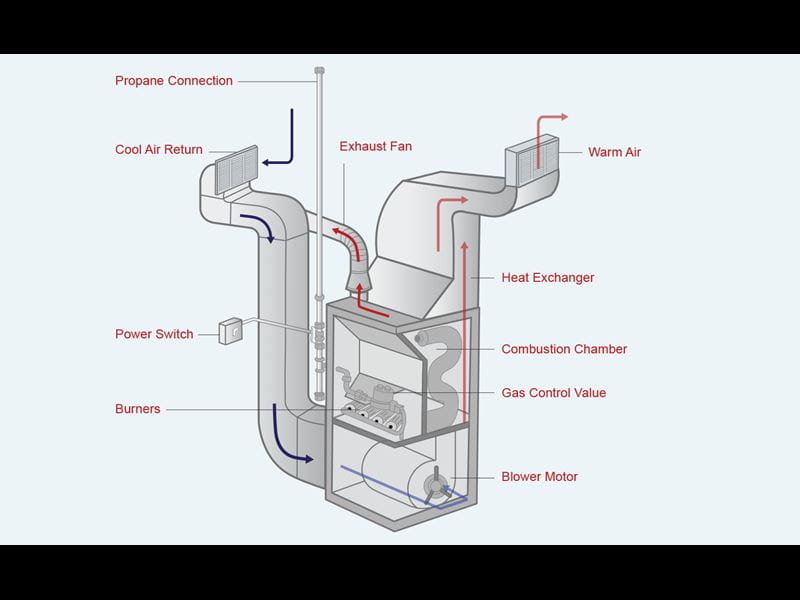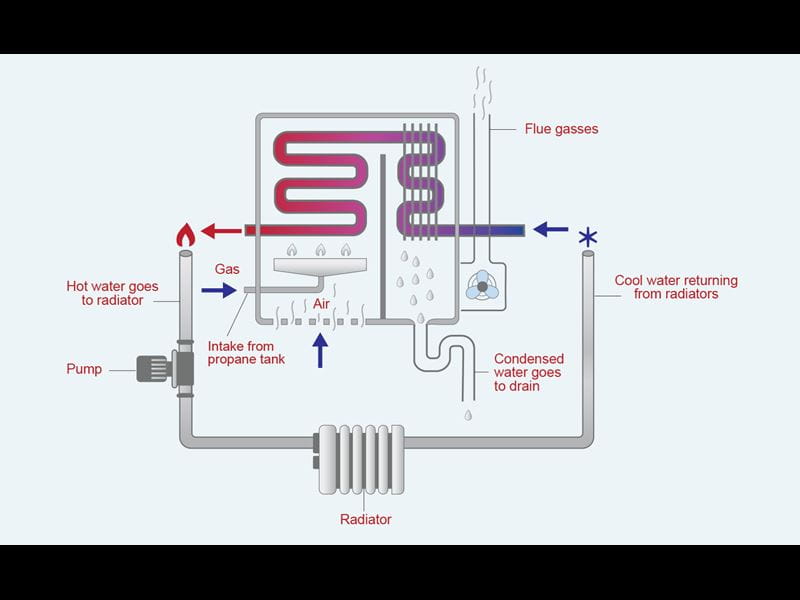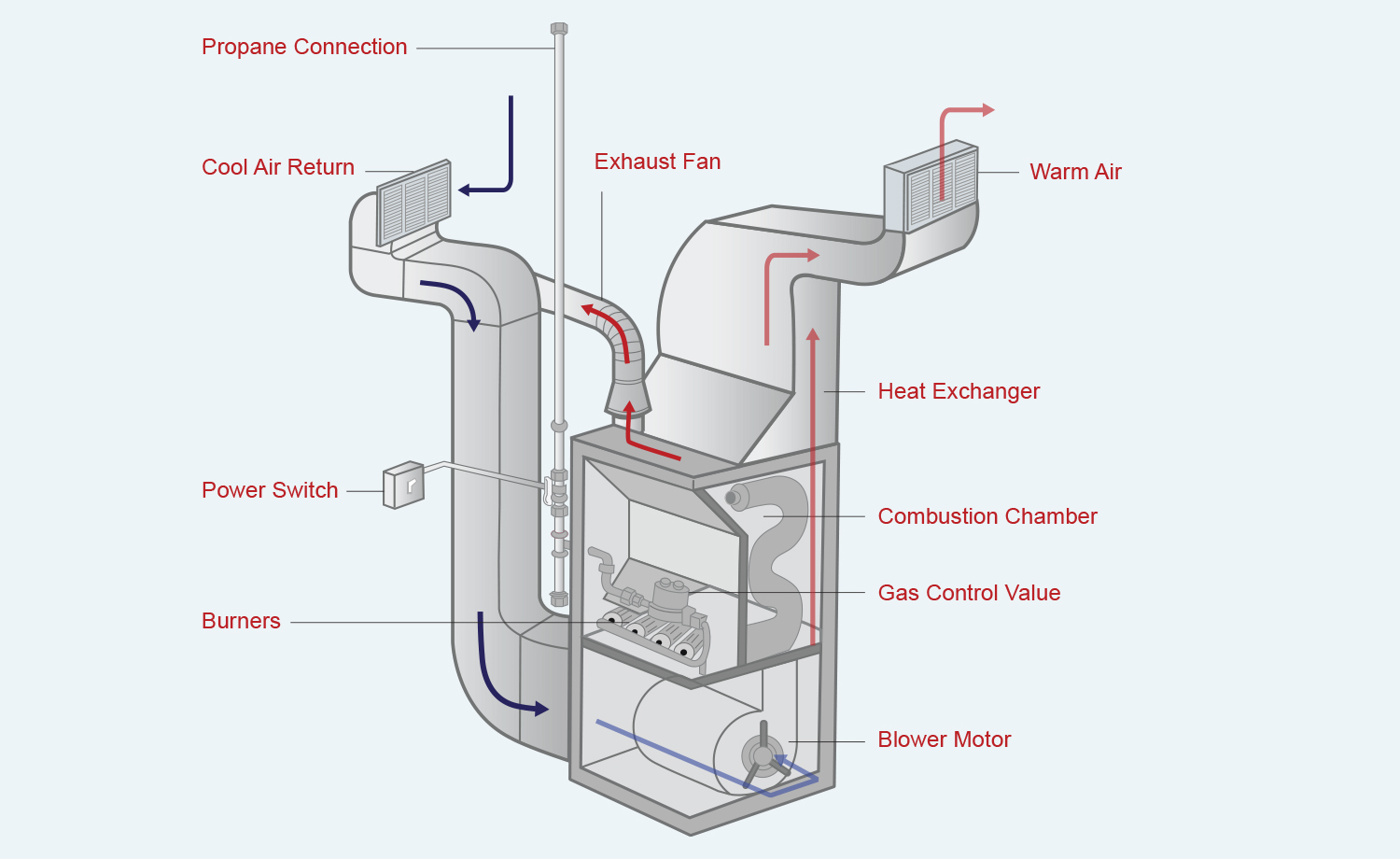What We Talk About When We Talk About “Propane Heaters”
We talk a lot about home heating and heaters. But scratch the surface, and that word — heater — can send us down a huge rabbit hole. Is the heater the same as your furnace? Is it a radiator? Is it a space heater? Water heater? Something else?
Short answer: A heater is all of these and more. To help you manage your home heating options, here are the basics. We’ll tell you how a propane heater works, the difference between a propane furnace and a boiler, and how forced-air heat really works.
Central Heating (The Basics)
Central heating systems are built around a primary appliance, typically located in a basement. This is the engine of the system, taking in fuel from your propane tank and distributing it throughout the home (or apartment complex, condo, or other building) through ducts that terminate in radiators, forced air vents, or other devices. Most homes require something heavy-duty — either a propane furnace or boiler — to serve as that engine. Other appliances, such as wall heaters and heat pumps (more on those below), provide complementary heat in smaller spaces.
Furnace vs. Boiler: What’s the Difference?
Here’s the basic difference between furnaces and boilers: A furnace uses fuel to heat air that then gets pumped into the rooms of the home (hence the term “forced-air furnace”). A boiler heats water that provides heat to objects -- like radiators. You can have either; many homes have both; others have a forced-air furnace as the primary heat source and a water heater specifically to heat the water we use to shower, do laundry, cook, and clean. Both furnaces and boilers need a fuel source such as propane to operate.
Propane Furnaces: Fire-Breathing Heat Engines
You might think of a furnace as a big oven in your basement. (Fun fact: The word furnace comes from the Greek word fornax, or oven.) A furnace uptakes indoor air, heats it, then sends the warm air through a duct system that blows it into each room of the house. Exhaust fumes (created from burning fuel) are sent outdoors through a separate ventilation system. The temperature is controlled with a thermostat located somewhere in the home.
Liquid propane (LP) gas furnaces are not simple fuel-heating or fuel-pumping machines. They are the hub of a complex system that includes both mechanical parts and heating elements — equipped to hold air conditioning and cooling systems in a single unit. In addition, the ventilation and combustion systems are calibrated to be as energy-efficient and safe as possible, and therefore must be installed and maintained only by trained professionals.

Boilers: Steam-Powered Home Heat
Boilers heat the home by turning water into steam, which is then propelled through pipes into heating devices in each room. Like furnaces, boilers also require a fuel source to generate heat. Some boilers are actually attached to a small furnace that heats the water. In this way, it’s similar to the forced-air furnace plus water heater configuration.

Propane Wall Heaters: A Warm Boost
Sometimes you’re heating a very small space. Or you have that one room in the house that just needs a warm boost on the coldest days. Enter the propane wall heater.
Relatively easy to install and maintain, propane wall heaters are mounted on a wall and controlled separately from the rest of the heating system. Working in the home office all day? A wall heater can keep you comfortable at your desk without having to use energy (and propane, and money) turning up the thermostat for the whole house.
Plus, for on-the-spot warmth, a propane wall heater outpaces electric space heaters and wood-burning stoves alike. Propane wall heaters warm up rooms faster than most electric space heaters can, and they don’t burn precious firewood (you also don’t have to keep buying firewood — you may be able to simply connect a line from your propane tank). And once they’re turned off, propane wall heaters keep the room warm longer than is the case with an electric space heater. All told, you stay warm longer, use the appliance less, and save energy.
Heat Pumps: Efficient All-Weather Heating and Cooling
If you’re curious about options that could eliminate the need for both a furnace and air conditioners, check out heat pumps. An alternative to a wall heater, these appliances use electricity to move heat from a cool space to a warm space — kind of like a refrigerator. So when it’s cold, a heat pump will bring in cold outdoor air, heat it, and send it into your home; when it’s hot, it will gather the warm indoor air and pump it out.
One subtype of heat pump is known as an absorption heat pump, or a gas-fired heat pump. These can connect to your existing propane system like other appliances do, offering an alternative or addition to a furnace or boiler system. A propane heat pump provides all-weather heating and cooling that’s cost- and energy-efficient.
Keep in mind that heat pumps don’t actually create heat, they just transfer it. That makes them ideal for mild and consistent climates, but not regions with severe weather.
Propane: A Heater’s Best Friend
Whether you choose a forced-air furnace, boiler, wall heater, heat pump, or some combination of these, heating with propane adds a level of efficiency that works for your lifestyle. So your “heaters” — however you define them — keep you comfortable year round.
Explore your heating options
Related Content:
Appliance Spotlight: Furnaces and Boilers
Space Heating Propane Options for Homeowners
Propane for Your Home - In Your Home
Residential Propane Go to blog list page filtered for the category

